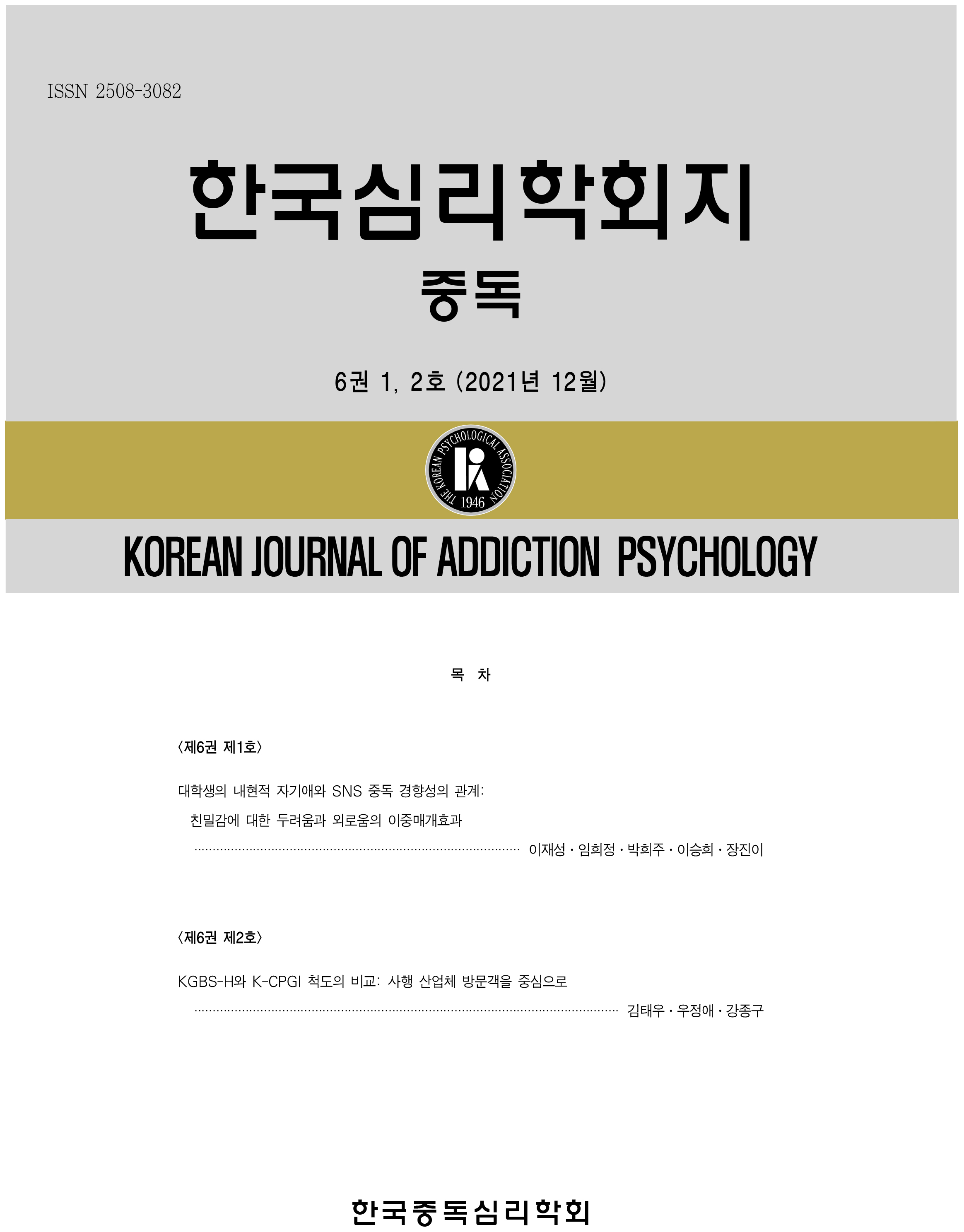Korean Journal of Addiction Psychology
- Log In/Sign Up
- P-ISSN2508-3082
 ISSN : 2508-3082
ISSN : 2508-3082
Vol.1 No.2
Abstract
The purpose of this study was to perform a validation of korean translation of the Clinical Outcomes in Routine Evaluation Outcome Measure(CORE-OM). After CORE-OM was translated into korean langage, two steps procedures were adopted for analysis. Firstly the study seeks a way to confirm four factors of CORE-OM with 483 college students. But the results of confirmatory factory analysis didn't confirmed 4 factor. So the result of exploratory factor analysis reveled 3 factors of CORE-OM. Korean version of CORE-OM showed hight internal consistency and test-retest reliability. Next at two step participants included a non-clinical group of 120(general adult) and a clinical group of 113(mental hospital and addiction consult centers). There was strong differentiation of the clinical and non-clinical samples, with the clinical group scoring significantly more psychological problems than the non-clinical group. Also result of convergent validity of the CORE-OM with SWLS, K-AQ, CES-D, SCL-90-R. were strongly correlated. In conclusion, these findings suggest that the CORE-OM is a highly reliable, valid measure to assess effect in psychological treatments. The limitations and suggestions for feature research were also discussed.
Abstract
This study verifies the difference of the program effectiveness and regulation effects by moderator variables among three programs which ate developes as the non- smoking group programs for youth: the Cognitive-Behavior Therapy(CBT), Motivational Interviewing(MI) and Motivational Interviewing and Cognitive-Behavior Therapy(MI-CBT). To this end, all the domestic papers and thesis about the programs of youth non-smoking group are reviewed from all studies published in Korea until May, 2015 from the time the data base, 19 of them are selected and meta-analyzed. The result are as below. firstly, the average value of effect size of 72 samples from 19 studies is 0.773. This value is middle. Secondly, the cognitive variables which is related to smoking behavior has the largest average value of the effect size among the dependent variables. Thirdly, CBT and MI-CBT has the large effect size whereas MI has the middle effect size about the amount of smoking which is one of major dependent variables. In the case of other dependent variables such as smoking factor and self-conception, there is no significant differences among the three programs. Fourthly, difference of effects which is depend on property of recipient and property of operating constitute the group programs are statistically insignificant. From these results, this paper covers the implications for the development of non-smoking program for youth which is based on the CBT and MI.
Abstract
The purpose of this study is to investigate the moderating effects of self-resilience on the relationship among self-oriented perfectionism, socially -prescribed perfectionism and depression of children. The subjects of this study consisted of 316, elementary school students from 5th and 6th grade. To measure the level of depression, Children Depression Inventory was used. The Resilience Scale was used to measure the level of self-resilience. Children' Perfectionism Scale was used to measure the level of perfectionism. To analyze statistical results, correlation analysis and hierarchical regression were used. The results indicate that depression and is negatively related to self-resilience. Self-oriented perfectionism and socially-prescribed perfectionism are positively related to depression. In other words, the more negative perfectionism, the greater the levels of depression and self-resilience. The results also indicate that self-resilience functions as a protective factor for children who have problems with depression in their self-oriented perfectionism and socially-prescribed perfectionism. Therefore, this study provides the importance of the development for self-resilience program to reduce the depression which causes perfectionism.